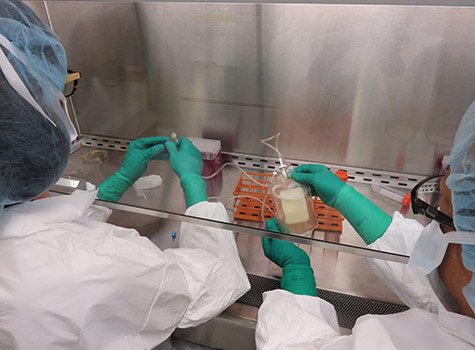
A technician handles DNA samples at Genesis Healthcare’s laboratory.
Photographer: Kiyoshi Ota/Bloomberg
Japan is rapidly aging, with a third of the population projected to be 65 or older by 2035. While more people are aware of health risks that can be detected through early DNA testing, Japan’s self-testing market is dwarfed by the U.S., where people spent $73 million on genetic exams last year, according to Kalorama Information. The two Japanese startups are betting that testing kits, as well as online services using compiled genetic data, will find greater demand as people become more confident in the technology.
“I see a lot of potential in the business,” said Genequest founder Shoko Takahashi.
Genesis, the No. 1 testing firm with 70 percent of the domestic market, has compiled data for more than 600,000 users, and is aiming to reach 1 million this year. It also operates as GeneLife in Japan. Rakuten Inc. invested 1.4 billion yen in the Tokyo-based startup last August, with Chief Executive Officer Hiroshi Mikitani joining its board.
So far in Japan, there aren’t any legal restrictions to consumer genetics tests. The Ministry of Economy, Trade and Industry has, however, cited the quality of tests as an area of concern. In 2013, the U.S. Food and Drug Administration told U.S. DNA-testing company 23andMe to stop selling their kits because the company failed to back its marketing claims. The FDA lifted the ban in 2017.
Food companies are also interested in the sector as a way to offer tailored meals and nutrition products. Nestle Japan Co. teamed up with Genesis in May to introduce a new app service that offers nutritional advice based on genetic testing.
Last year, Genequest was bought out by Euglena Co., a health drink and supplement company. Together, the companies are now selling DNA tests for alcohol tolerance.
Market growth will depend on how accurate home kits get, said Fumiyoshi Sakai, an analyst at Credit Suisse Securities. “It is about technological innovation,” he said.
Although home-testing kits aren’t as accurate as more thorough clinical tests, they are useful for identifying enough genetic factors for people to change their lifestyle, according to Genequest’s Takahashi. There’s still room for improvement, and growth, she said.
“No one in the world has found a winning pattern in this business yet,” Takahashi said. “It is going to take time and money” for the sector to grow, she said.
https://www.bloomberg.com/news/articles/2018-07-17/home-dna-testing-starts-to-gain-ground-in-japan-s...